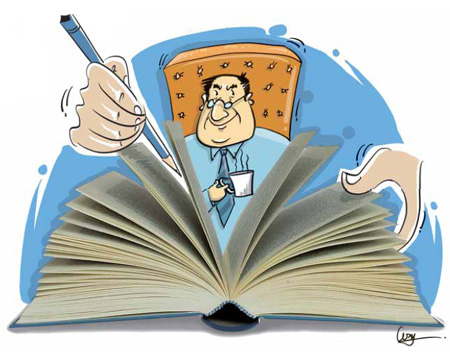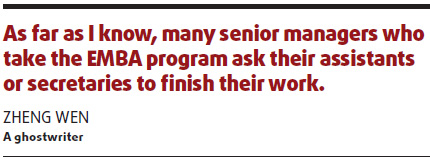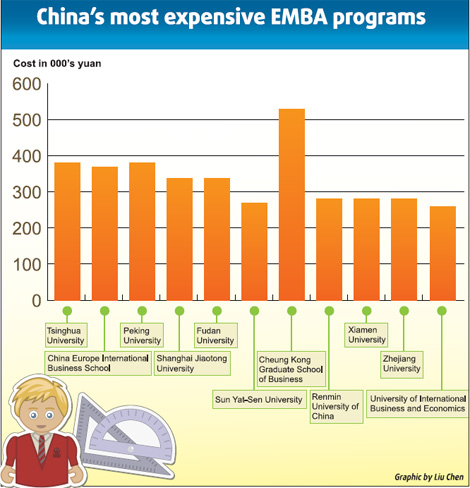Top Biz News
B-School fees skyrocket
By Wang Hongyi (China Daily)
Updated: 2009-11-19 08:10

The supply and demand principles of economics tell us prices that go up will one day come down.
But there is no rule without exceptions, certainly in the world of business education, where tuitions at Executive Master of Business Administration (EMBA) programs are increasingly pricy.
Early this year Cheung Kong Graduate School of Business (Cheung Kong GSB) hiked tuition for its well-regarded EMBA program to 528,000 yuan ($77,335.44), making it the most expensive.
The price tag may have shocked some applicants, but the decision was in line with the general trend in the nation's business schools.
China Europe International Business School (CEIBS) recently announced it would raise its EMBA tuition next year to 398,000 yuan, an increase of 40 percent compared to 1995.
Renmin University of China will also increase tuition to 360,000 yuan from its current 280,000 yuan, while Nankai University's EMBA will skyrocket from 98,000 yuan to 268,000 yuan.
China authorized EMBA programs in 2002 and the past seven years witnessed extraordinary growth in the number of schools and enrollment.
Institutions certified to offer EMBA education have increased to 62 from the initial 30, with more than 100 advanced business programs now on the market.
According to education departments, annual EMBA enrollment has risen to 15,000 students.
But even as supply increased, tuition costs continued to spiral upwards, increasing on average 45 percent over the past seven years, with the country's top-ranked schools now charging more than 300,000 yuan per person.
What's more, business school insiders believe that there is still much room for increase in EMBA charges.
But why does it cost so much?
"EMBA programs can provide broader professional perspectives in business and management that helps people move to a more strategic level on the corporate ladder," said a staff member surnamed Zhang from Cheung Kong GSB.
Unlike traditional education or undergraduate business programs that receive some financing from the government, most business schools have long been self-funded, with tuition covering the costs of professors' salaries, administrative staff, buildings, equipment and other expenditures.
To gain the coveted cachet of "an international business school", many EMBA programs also establish an overseas campus or invite eminent foreign professors and scholars.
Even so, there is still an envious profit margin in the programs.
According to the magazine Sino-manager, a confidential income and expenditure table of a business school show fixed costs account for less than 10 percent of total tuition, with gross profit reaching 70 percent, equal to luxury goods.
"Although business schools are expensive, students are willing to pay because they expect they can recoup their investment with well-paying jobs after graduation," said a professional working in EMBA enrollment at a Beijing's university who asked for anonymity.
"In fact, it tends to be more difficult attracting top students if the EMBA program priced below the market," he said.
"Our tuition is about 50,000 to 80,000 yuan less than other business schools, but students think our program is not as good because it is so cheap."
"They hold the notion that schools with lower tuitions cannot afford to provide all the quality services they expect from a top business school."
But even as students compete passionately to get into top-flight business schools with tuitions pushing 500,000 yuan, not all EMBA students have rigorous attitude toward study.
"Senior managers are inevitably very busy. They are more willing to 'author' papers written for them by ghostwriters," a business education insider said.
Office worker Zheng Wen (not his real name), who has a master's degree in business management from the country's top university, has wide experience as a ghostwriter.
| ||||
"As far as I know, many senior managers who take the EMBA program ask their assistants or secretaries to finish their work."
A review of the Top 20 EMBA programs released by Sino-manager magazine last week shows schools that top the list are also the most expensive.
In general, a typical EMBA candidate at an elite school is a senior manager with eight to ten years of experience and an excellent career background.
"The connections gained through an EMBA are more valuable (than the instruction itself)," said 38-year-old Steve Zhang, who graduated with an MBA from the US.
"Most students have successful track records. In an MBA or EMBA program you can meet and establish networks that are very useful for future development. And it is an important consideration for students when choosing a program."















